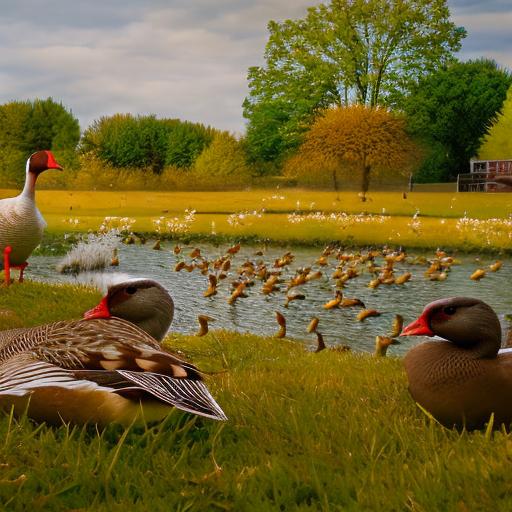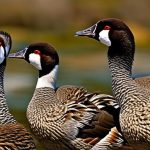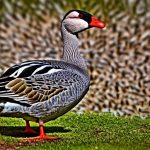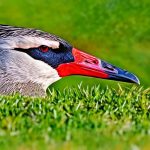Having a yard is a wonderful thing. It provides a space for relaxation, play, and gardening. However, the beauty of a yard can be quickly ruined by the presence of geese. These birds are notorious for leaving behind droppings that can make a mess of your lawn and walkways. In order to effectively keep geese away, it is important to understand their behavior and what attracts them to certain areas.
Key Takeaways
- Geese are social animals that travel in flocks and have a strong instinct to protect their young.
- Geese may enter your yard in search of food, water, or a safe place to rest and nest.
- Physical barriers such as fences, netting, and hedges can be effective in keeping geese out of your yard.
- Decoys, scarecrows, and loud noises can be used to scare geese away from your property.
- Landscaping strategies such as planting unappealing vegetation and removing standing water can make your yard less attractive to geese.
Understanding the behavior of geese
Geese are migratory birds, meaning they travel long distances in search of food and suitable nesting grounds. They typically migrate in large flocks, following specific routes known as flyways. Understanding their migratory patterns can help in predicting when they are likely to pass through your area.
Geese are highly social animals and communicate with each other using a variety of vocalizations and body language. They use honking sounds to communicate with each other and establish their territory. By understanding their communication methods, you can better understand their behavior and find ways to deter them from entering your yard.
Geese are attracted to certain areas for a variety of reasons. They are herbivores and feed on grasses, grains, and aquatic plants. They are also attracted to open spaces near water sources, such as ponds or lakes, where they can find food and feel safe from predators. Additionally, geese are attracted to areas with short grass, as it provides easy access to food and allows them to keep an eye out for potential threats.
Identifying the reasons why geese enter your yard
There are several factors that can attract geese to your yard. One of the main factors is the presence of water. Geese need water for drinking and bathing, so if you have a pond or any other water feature in your yard, it is likely to attract them.
Another factor that attracts geese is the availability of food. If you have a well-maintained lawn with short grass, it can provide an easy source of food for geese. They will also be attracted to any plants or shrubs that produce berries or seeds.
Geese may also enter your yard if they feel threatened or if they are looking for a safe place to nest. If you have pets or children that frequently use the yard, it can make geese feel uneasy and cause them to seek out a different location.
Creating physical barriers to keep geese out
One effective way to keep geese out of your yard is by creating physical barriers. There are several types of barriers that can be used, including fences, netting, and hedges.
Fences can be an effective way to keep geese out, but they need to be at least three feet high to prevent the birds from flying over them. Netting can also be used to cover areas where geese are likely to land or feed. However, it is important to make sure the netting is securely fastened and does not pose a risk to other wildlife.
Hedges can also be used as a natural barrier to keep geese out. They provide a physical barrier that prevents the birds from accessing your yard. However, hedges require regular maintenance and may take time to grow and become effective.
Using decoys and scare tactics to deter geese
Another method for keeping geese away from your yard is by using decoys and scare tactics. Decoys are objects that resemble geese and can be placed in your yard to deter real geese from entering. These decoys can be made of plastic or other materials and should be placed in areas where geese are likely to land or feed.
Scare tactics can also be effective in deterring geese. These tactics include using noise makers, such as air horns or whistles, to startle the birds and make them feel threatened. Another scare tactic is using visual deterrents, such as reflective tape or scarecrows, to create a sense of danger and make geese think twice before entering your yard.
Implementing landscaping strategies to make your yard less attractive to geese
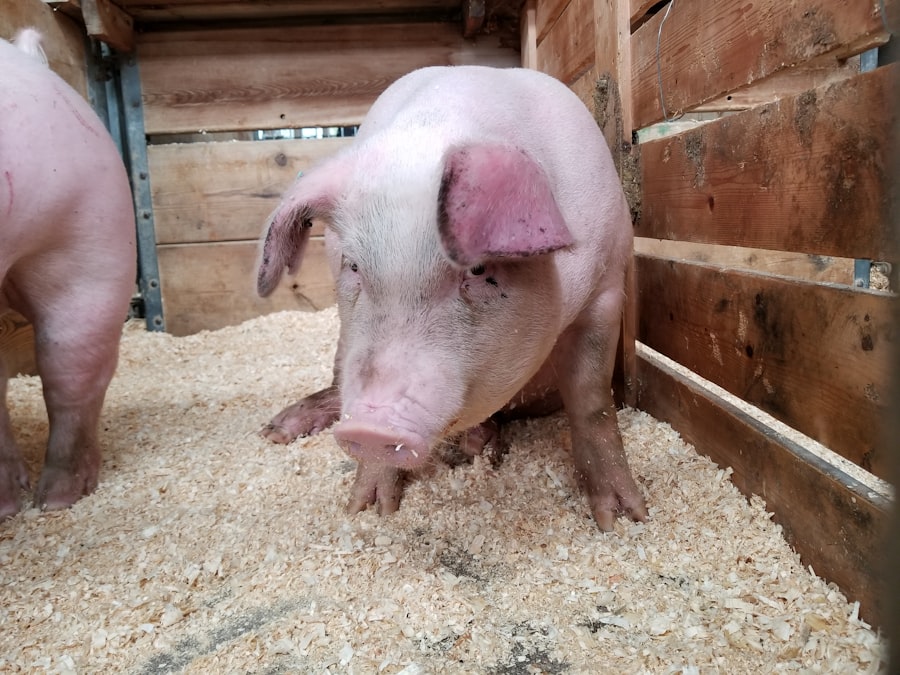
One way to make your yard less attractive to geese is by implementing landscaping strategies that discourage them from entering. This can include planting tall grasses or shrubs that make it difficult for geese to access your yard. You can also plant vegetation that is unappealing to geese, such as prickly bushes or plants with strong odors.
Another landscaping strategy is to create barriers using rocks or other natural materials. These barriers can be placed around water features or areas where geese are likely to land, making it difficult for them to access your yard.
Installing motion-activated sprinklers to repel geese
Motion-activated sprinklers can be an effective way to repel geese from your yard. These sprinklers are equipped with motion sensors that detect the presence of geese and activate a burst of water. The sudden spray of water startles the birds and makes them think twice before entering your yard.
One of the benefits of using motion-activated sprinklers is that they are a humane way to deter geese. They do not harm the birds, but simply startle them and encourage them to find a different location.
However, there are some drawbacks to using motion-activated sprinklers. They require a water source and may increase your water bill. Additionally, they may not be effective in all situations, as some geese may become accustomed to the spray of water over time.
Using sound deterrents to keep geese away
Sound deterrents can also be used to keep geese away from your yard. These deterrents emit loud noises or sounds that mimic the distress calls of geese, making them feel threatened and encouraging them to leave.
One type of sound deterrent is a sonic device that emits a high-pitched sound that is unpleasant to geese. These devices can be placed in your yard and set to activate when geese are detected.
Another type of sound deterrent is a predator call, which mimics the sound of a natural predator, such as a hawk or owl. This can scare geese away, as they perceive the presence of a predator as a threat.
However, there are some drawbacks to using sound deterrents. They may not be effective in all situations, as some geese may become accustomed to the sounds over time. Additionally, they may also disturb other wildlife or your neighbors.
Applying taste and smell repellents to discourage geese from entering your yard
Taste and smell repellents can be used to discourage geese from entering your yard. These repellents are applied to the grass or other areas where geese are likely to land or feed, and they emit an odor or taste that is unpleasant to the birds.
One type of taste repellent is a bitter spray that can be applied to the grass. This spray has a strong taste that geese find unappealing, discouraging them from feeding in your yard.
Another type of repellent is a scent-based product that emits an odor that geese find unpleasant. These products can be sprayed on the grass or placed in areas where geese are likely to land.
However, there are some drawbacks to using taste and smell repellents. They may need to be reapplied regularly, especially after rain or watering. Additionally, they may also affect other wildlife or pets in your yard.
Educating your neighbors about the importance of keeping geese away
It is important to educate your neighbors about the problems associated with geese and the importance of keeping them away. Geese can cause damage to lawns, walkways, and gardens, and their droppings can pose a health risk.
By working together with your neighbors, you can create a united front against geese and implement strategies to keep them away. This can include implementing physical barriers, using scare tactics, or applying taste and smell repellents.
Educating your neighbors about the importance of keeping geese away can also help to create a sense of community and encourage everyone to take action.
Seeking professional help to deal with persistent geese problems
If you have tried various methods to keep geese away from your yard and are still experiencing persistent problems, it may be time to seek professional help. There are companies that specialize in geese management and can provide expert advice and assistance.
A professional can assess your specific situation and recommend the most effective methods for keeping geese away. They may also be able to provide ongoing maintenance and monitoring to ensure that the problem does not return.
Hiring a professional to deal with persistent geese problems can save you time and frustration, and ensure that your yard remains free from these unwanted visitors.
Keeping geese away from your yard can be a challenge, but with the right strategies and techniques, it is possible to create a goose-free environment. By understanding the behavior of geese and what attracts them to certain areas, you can implement physical barriers, use decoys and scare tactics, implement landscaping strategies, install motion-activated sprinklers, use sound deterrents, apply taste and smell repellents, educate your neighbors, and seek professional help if needed.
Taking action to keep geese away from your yard will not only protect your property but also create a safe and enjoyable space for you and your family. So don’t let geese ruin the beauty of your yard any longer – take the necessary steps to keep them away.
If you’re looking for effective ways to keep geese out of your yard, you might also be interested in exploring the benefits of having a chicken coop in your garden. Not only can a chicken coop provide a safe and secure space for your feathered friends, but it can also act as a natural deterrent for geese. To learn more about large chicken coop ideas, garden chicken coops, and even the unique concept of the chicken coop country diner, check out Poultry Wizard’s informative articles at https://poultrywizard.com/keeping-chickens/large-chicken-coop-ideas/, https://poultrywizard.com/keeping-chickens/garden-chicken-coop/, and https://poultrywizard.com/keeping-chickens/the-chicken-coop-country-diner/.
FAQs
What are some effective ways to keep geese out of my yard?
There are several effective ways to keep geese out of your yard, including installing physical barriers such as fences or netting, using decoys or scare tactics, and modifying the landscape to make it less attractive to geese.
What types of fences or netting work best for keeping geese out?
Fences or netting that are at least 3-4 feet tall and have small mesh openings (less than 2 inches) are most effective at keeping geese out of your yard. Electric fences can also be effective, but should only be used by experienced individuals.
What are some effective scare tactics for keeping geese away?
Scare tactics such as loud noises, motion-activated sprinklers, and visual deterrents like reflective tape or balloons can be effective at keeping geese away. However, these methods may need to be rotated or changed periodically to remain effective.
What types of landscape modifications can make my yard less attractive to geese?
Modifications such as removing or trimming tall grasses, reducing water sources, and planting unattractive vegetation can make your yard less attractive to geese. Additionally, installing barriers around areas where geese are likely to congregate, such as ponds or lakes, can also be effective.
Are there any legal restrictions on how I can keep geese out of my yard?
Yes, there may be legal restrictions on how you can keep geese out of your yard, depending on your location and the species of geese in question. It is important to check with your local wildlife agency or municipality before implementing any methods to deter geese.
Meet Walter, the feathered-friend fanatic of Florida! Nestled in the sunshine state, Walter struts through life with his feathered companions, clucking his way to happiness. With a coop that’s fancier than a five-star hotel, he’s the Don Juan of the chicken world. When he’s not teaching his hens to do the cha-cha, you’ll find him in a heated debate with his prized rooster, Sir Clucks-a-Lot. Walter’s poultry passion is no yolk; he’s the sunny-side-up guy you never knew you needed in your flock of friends!

